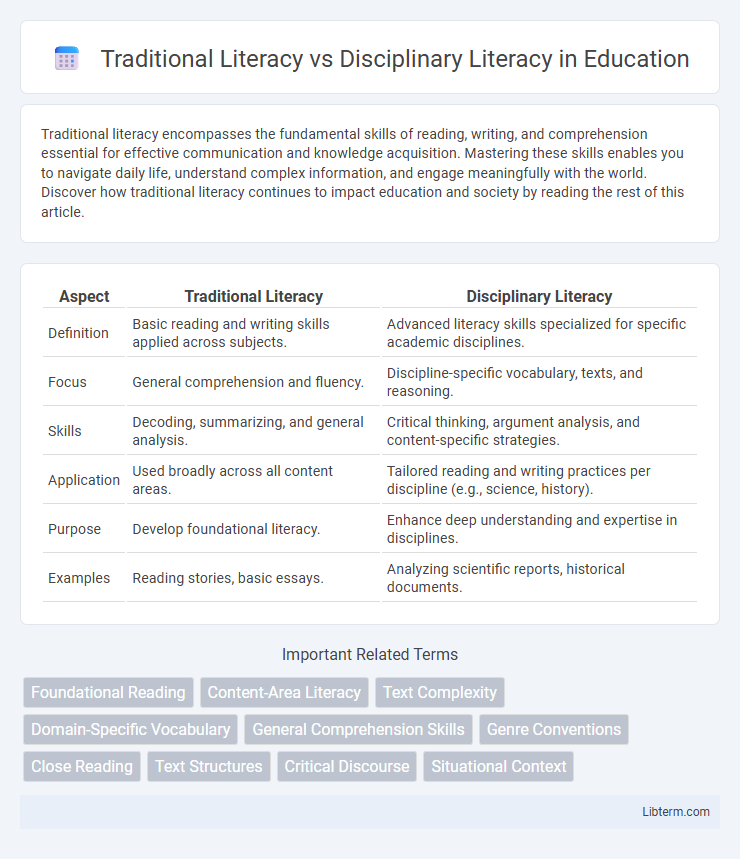Traditional literacy encompasses the fundamental skills of reading, writing, and comprehension essential for effective communication and knowledge acquisition. Mastering these skills enables you to navigate daily life, understand complex information, and engage meaningfully with the world. Discover how traditional literacy continues to impact education and society by reading the rest of this article.
Table of Comparison
| Aspect | Traditional Literacy | Disciplinary Literacy |
|---|---|---|
| Definition | Basic reading and writing skills applied across subjects. | Advanced literacy skills specialized for specific academic disciplines. |
| Focus | General comprehension and fluency. | Discipline-specific vocabulary, texts, and reasoning. |
| Skills | Decoding, summarizing, and general analysis. | Critical thinking, argument analysis, and content-specific strategies. |
| Application | Used broadly across all content areas. | Tailored reading and writing practices per discipline (e.g., science, history). |
| Purpose | Develop foundational literacy. | Enhance deep understanding and expertise in disciplines. |
| Examples | Reading stories, basic essays. | Analyzing scientific reports, historical documents. |
Understanding Traditional Literacy
Traditional literacy encompasses fundamental language skills such as reading, writing, speaking, and listening, essential for daily communication and basic comprehension. It involves decoding texts, recognizing vocabulary, and understanding grammar to interpret written materials effectively. Mastery of traditional literacy forms the foundation for more specialized literacy types, enabling learners to engage with diverse content across various contexts.
Defining Disciplinary Literacy
Disciplinary literacy refers to the specific reading, writing, and thinking skills required to understand and communicate knowledge within a particular academic discipline, such as science, history, or mathematics. Unlike traditional literacy, which emphasizes general reading and writing skills across all contexts, disciplinary literacy involves mastering the unique language, conventions, and analytical methods used by experts in each field. This specialized literacy supports deeper comprehension and critical engagement by enabling learners to interpret subject-specific texts, data, and symbols effectively.
Historical Evolution of Literacy Concepts
Traditional literacy primarily centers on basic reading, writing, and arithmetic skills essential for everyday communication, reflecting early educational models focused on functional competence. Disciplinary literacy emerges from a deeper understanding that literacy practices vary across academic disciplines, evolving historically alongside educational reforms and cognitive research emphasizing critical thinking and content-specific skills. This evolution highlights a shift from generic literacy abilities toward specialized reading and writing strategies tailored to distinct fields such as history, science, and mathematics.
Core Skills in Traditional Literacy
Traditional literacy emphasizes core skills such as reading comprehension, vocabulary development, phonemic awareness, and writing proficiency. These foundational abilities enable individuals to decode, understand, and communicate text effectively across general contexts. Mastery of traditional literacy skills is essential for navigating everyday reading and writing tasks, forming the basis for more specialized disciplinary literacy.
Unique Practices in Disciplinary Literacy
Disciplinary literacy emphasizes specialized reading, writing, and thinking practices unique to specific academic fields, such as sourcing evidence in history or interpreting data in science. Unlike traditional literacy, which focuses on general comprehension and communication skills, disciplinary literacy trains learners to engage deeply with content-specific texts and genres. This approach enhances students' ability to analyze, evaluate, and create knowledge within distinct disciplines, fostering critical thinking tailored to each subject's conventions.
Differences in Reading Strategies
Traditional literacy primarily emphasizes decoding, vocabulary, and comprehension skills across general texts, focusing on surface-level understanding. Disciplinary literacy requires specialized reading strategies tailored to specific content areas, such as analyzing primary sources in history or interpreting data in science. These strategies involve critical thinking, domain-specific vocabulary, and text structures unique to each discipline, enabling deeper engagement with subject matter.
The Role of Content Knowledge
Content knowledge plays a critical role in disciplinary literacy by enabling students to engage deeply with subject-specific texts, employing specialized vocabulary and analytical skills unique to fields such as science, history, and mathematics. Traditional literacy emphasizes fundamental reading and writing skills applicable across various contexts, while disciplinary literacy requires mastery of content knowledge to interpret complex information, construct arguments, and solve problems within a discipline. Effective disciplinary literacy instruction integrates content expertise with literacy strategies to enhance comprehension and critical thinking in academic and professional domains.
Classroom Implications and Instructional Approaches
Traditional literacy centers on foundational reading and writing skills essential for general comprehension, employing standardized instructional approaches that emphasize phonics, vocabulary development, and basic text analysis within classroom settings. Disciplinary literacy requires students to engage with specialized content-specific texts, using instructional strategies that integrate subject-area conventions, critical thinking, and analytical skills tailored to disciplines such as science, history, or mathematics. Classrooms that implement disciplinary literacy shift from generic literacy instruction to embedding literacy practices aligned with each discipline, fostering deeper understanding and improved content mastery through specialized reading, writing, and communication techniques.
Challenges in Integrating Disciplinary Literacy
Integrating disciplinary literacy into education presents challenges such as aligning subject-specific reading and writing skills with traditional literacy frameworks, which often emphasize general comprehension and vocabulary. Educators face difficulties in designing curriculum that simultaneously addresses disciplinary content knowledge and critical thinking skills specific to fields like science, history, and mathematics. Limited professional development opportunities and assessment tools tailored for disciplinary literacy further impede effective implementation across diverse classrooms.
The Future of Literacy Education
The future of literacy education emphasizes integrating disciplinary literacy, which involves teaching students to read, write, and communicate effectively within specific subject areas, enhancing critical thinking and content understanding beyond traditional literacy skills. Advanced digital tools and personalized learning platforms are expected to support this shift by providing targeted content and assessments tailored to various disciplines like science, history, and math. Educators increasingly focus on developing students' ability to navigate complex texts and discipline-specific vocabulary, preparing them for academic and professional success in a rapidly evolving information landscape.
Traditional Literacy Infographic

 libterm.com
libterm.com